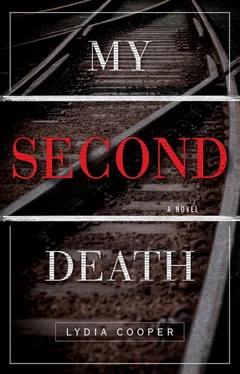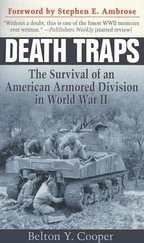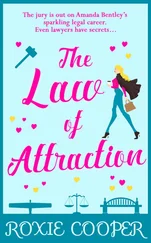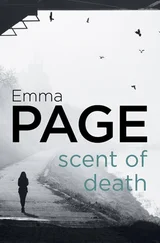“She’s in a home,” I say. “Assisted living for the mentally or physically disabled. It’s called Harvest Home.”
She nods as if she knows this.
“Why was she at the house when the others weren’t?”
Judith Greene shakes her head as if chasing away a mosquito. “I didn’t — I don’t know. We found her when — the paramedics came. I was the one who called the fire department, you know.” She looks at me sharply when she says this last part. I don’t tell her that I already know, thanks to the 911 call being public record.
We are quiet for a while. I think about her phrasing: She shouldn’t have had to be there.
I say, “Thank you for the tea and company.” She looks up at me and remembers her face and smiles, but it looks like putting on a mask. Her eyes are still far away.
“So, Handel’s Messiah ? I’ll come. This time I mean it.”
Her smile carves dimples in her cheeks and forms rolls under her chin. “Oh, good. It’s so beautiful.”
She follows me to the door. I escape into the cold and hurry to the car. Her scent seems to linger in my clothes and on my skin.
As I drive away from Judith Greene’s cat litter-scented hovel, I think about the pristine cleanliness of Aidan’s sister’s house. So when I pull into the gravel lot behind our apartment building, I’m surprised to see Miranda’s silver Audi bumper-kissing our dented industrial-sized trash bin. It’s like I’ve conjured her with the force of my imagination.
I grab my backpack out of the car and trot up the stairs. Inside, their voices tangle together, viola and violin in a sudden crescendo.
“—so fucking immature!” Miranda’s voice careening into soprano range.
“ Me immature! You’re the one who won’t talk about anything, oh, like it’s really mature to just completely rewrite history, pretend nothing ever happened. You can pretend you never had a mother but you can’t pretend she doesn’t exist, because she does and she misses —”
“And, what, my moral shortcomings give you permission to give my name and address to every psychopath in the greater Akron area? Do you have any idea what—”
I slide off my shoes and rest my backpack near the coat rack, and walk into the kitchen.
They are standing in the living room. Miranda is dressed in a charcoal gray pinstripe pantsuit. The tucked waist on the suit jacket, cream-colored silk shirt underneath. Her smooth dark hair, her perfect dark eyes.
Aidan is standing close to her, his back to the window. An opened sketchpad lies at his feet, his charcoal sticks scattered on the carpet. His eyes move when he sees me. Some expression crosses his face, some tightening across the forehead, the eyebrows slanting down at the sides as if he’s sad or anxious.
Miranda twists around to see what has disturbed him. Her coral-pink lips, twisted in mid-sentence, freeze.
We just stare at each other for a second.
Then I say, “Hey. What’s up.”
Miranda pushes her brother aside and strides across the living room. Her thin heels make hollow clunks through the balding carpet. She puts her finger in my face. The fingernail is glossy and rose pink.
“ You ,” she says, “need to back off. Get out of my family’s business and stay out. Do you understand?”
“Miranda,” Aidan says. He reaches for her arm. He grabs her wrist but instead of digging his fingers into the tendons to get her attention, he slides his hand down and wraps his fingers around the fleshy part of her palm. His face is a stark contrast to the tenderness of the gesture, angry ridges across his forehead, between his eyebrows. “Settle down. Okay? She’s a friend. Come on.”
“A friend? A friend .” Miranda lets out a laugh. She inhales and her shoulders relax. She takes a step back. She does not pull her left hand out of Aidan’s grip. “When will you understand that the pervert who hangs out by the used games store is not a friend , Aidan. These people need treatment. They need to be kept—”
Aidan says, “Shut up.”
She shuts her mouth. She takes her hand out of his and turns to look at him. Her mouth is pinched so tight that fine wrinkles radiate from the edges of her lips. She straightens the collar on his faded shirt.
“I have to go back to work. You get this — this friend — to stay away. You understand? You need to get away from these, these needy people. And do not entangle me in your quixotic stupidity any more. You hear?”
She looks over at me, and then she bends over and takes her purse from beside the couch. She walks out. Her heels echo all the way down the stairs. Aidan stands in the living room. His face is flushed. He puts his hands in his pockets and goes over to the window, watches her pull out of the driveway.
He says, “Sorry about that.”
“Quixotic.”
“What?” He looks over his shoulder at me.
I smile at him. “Quixotic. That was a nice expression. Your sister’s kind of all right.”
He wipes the back of his hand over his mouth and then stretches his shoulders. “Kind of all right. Come on. She’s terrifying .” But he grins while he says it.
I don’t know what to say.
He goes into the kitchen. I watch him pull the last orange out of the fruit basket and peel it. He drops the rinds in the sink and I open my mouth to tell him we don’t have a disposal. But I can get rid of them later easily enough. And I’ve already been enough of a shithead to him today.
I hear myself saying, “Look, I’m sorry about your sister. I really am. I won’t do that again.”
He carries the plate of sliced oranges into the living room and sits down in front of his opened sketch pad. He glances up at me. “Don’t worry about it.” He watches me for a second and then he smiles.
I go over to the couch and sit down.
He reaches over and turns on music. R.E.M. at the height of their late-nineties glory.
“Oh God,” I say.
He grins at me and cranks up the volume. Michael Stipe is singing something about losing his religion. Aidan squints like he’s thinking about some impromptu karaoke. I have heard him attempt this before in the shower and he is not exactly vocally gifted.
I grab his plate of oranges and pick up a slice.
“I’ll kill you.”
He laughs. “With an orange and your ninja skills?”
“You shouldn’t underestimate the strength of my desire not to hear you singing,” I say. But I don’t pitch the orange slice at him. I just stick it in my mouth and suck the juice from the bitter white pith.
He grins and bends his head to his drawing pad. Under his breath he starts whispering, “ — me in the cor-ner.”
I turn my head to watch what he’s drawing. And as his hand sweeps over the page I notice his arm. His sleeves are pushed up past his wrists. Four yellowed bruises with dark red half-moon crescents carved into the center of each bruise stagger across the pale inside of his arm. I remember his bandaged fingers when he came over to the house for Stephen’s birthday.
“Hey,” I say. “Tell me about your sister. The fucked up one.”
He stops sketching and reaches over to turn down the music. “Why?”
Because he walks around with battered arms and fingers like most people wear a well-worn T-shirt. Because I can’t tell if he accepts damaged minds or is dangerously drawn to them.
“Because I want to know about her,” I say. “Because of that.” I point to his arm.
He looks at me with that blank dark eye and then bends his head again.
“Because she’s retarded,” I say.
“Listen,” he says, and flips a page on the sketchpad. He’s not yelling, like Miranda, but his voice is taut, trembling at the edges. “She has autism. So quit saying ‘retarded.’ And there’s nothing to tell. You want to know when her birthday is? She’s turning thirty on Tuesday. She wears a diaper. She hits people. If she gets her hands on a sharp object she jams it into whoever touches her. She’s a fan of eighties hit bands like Queen. Oh, and she loves the color yellow.”
Читать дальше












